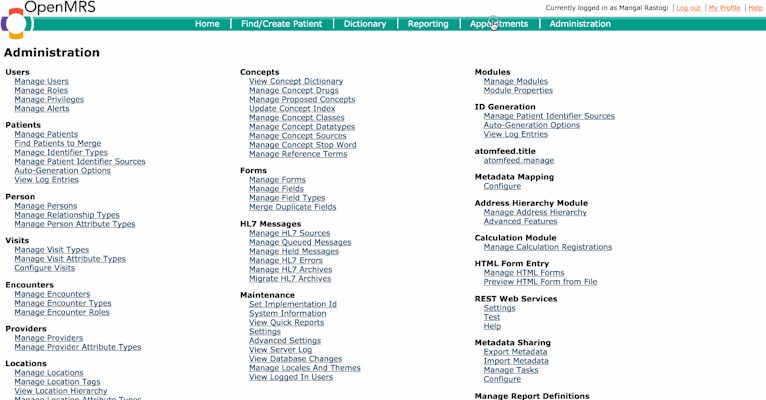This is a separate page right now in the clinical module of the app (named--ConsultationContext). The routing to this page is configured in the default config, default-config/openmrs/apps/clinical/extension.json as:
A new tab starts showing up in the patient search page as "Programs".
"bahmniCLinicalPatientsSearchActicePatientsForPrograms" : {
| Table of Contents |
|---|
Configure Programs tab in Clinical Patient Search
Add the following configuration to the extension.json file present in the clinical apps config folder.
| Code Block | ||||||
|---|---|---|---|---|---|---|
| ||||||
"bahmniCLinicalPatientsSearchActicePatientsForPrograms" : {
"id": "bahmni.clinical.patients.search.allPatients",
"extensionPointId": "org.bahmni.patient.search",
"type": "config",
"extensionParams": {
"searchHandler": "emrapi.sqlSearch.activePatientsByProvider",
"display":"Programs",
"forwardUrl" : "#/programs/patient/{{patientUuid}}/consultationContext"
},
"label": "Programs",
"order": 1,
"requiredPrivilege": "app:clinical"
} |
A new tab "Programs" will be shown in the clinical patient search page
...
Configuring Programs app in dashboard
Implementer can configure a separate app for 'programs' on the application dashboard. The program app would be the same as the clinical app with separate configuration for patient queues.
The name of the extension config will be picked up from app's url. The convention to introduce is that the first param after # in the app's url would be the name of the extension config that needs to be picked up.
| Info |
|---|
As an example, The app's url should look like https://172.18.2.10/bahmni/clinical/#/{{extension_name}}/patient/search |
| Code Block | ||||||
|---|---|---|---|---|---|---|
| ||||||
"programs": {
"id": "bahmni.programs",
"extensionPointId": "org.bahmni.home.dashboard",
"type": "link",
"label": "Programs",
"url": "../clinical/#/programs/patient/search",
"icon": "fa-tasks",
"order": 2,
"requiredPrivilege": "app:clinical"
} |
And the programs can have its own configuration
| Code Block | ||||||
|---|---|---|---|---|---|---|
| ||||||
{ "bahmniClinicalPatientsSearchActivePatientsForPrograms": { "id": "bahmni.clinical.patients.search. |
...
activePatients", |
...
"extensionPointId": "org.bahmni.patient.search", |
...
"type": "config", |
...
"extensionParams": { |
...
"searchHandler": "emrapi.sqlSearch. |
...
activePatients", |
...
"display": "Programs", |
...
"forwardUrl" |
...
: "#/programs/patient/{{patientUuid}}/consultationContext" |
...
}, |
...
"label": " |
...
Active", |
...
"order": 1 |
...
, "requiredPrivilege": "app:clinical" }, "bahmniClinicalPatientsSearchAllPatients": { "id": "bahmni.clinical.patients.search.allPatients", "extensionPointId": "org.bahmni.patient.search", "type": "config", "extensionParams": { "display": "All", "forwardUrl": "#/programs/patient/{{patientUuid}}/dashboard" }, "label": "All", "order": 2, "requiredPrivilege": "app:clinical" |
...
Programs, in order to be displayed in the programMangement page, have to be separately created as concepts in OpenMRS.
...
}
} |
...
Creating new Programs in OpenMRS
Programs creation is done in OpenMRS app as shown in the gif below.
| Warning |
|---|
Having more than one workflow for a program is not supported |
| Warning |
|---|
Initial & terminal states flags should not be used as they are not supported by Bahmni |
...
Associating program to encounter type
To associate program to encounter type, Bahmni uses the generic entity mapping concept which can be configured as explained below
In the entity_mapping_type table, add a record to define the mapping between program and encounter type
Code Block language sql title entity_mapping_type entry insert into entity_mapping_type(name, uuid, entity1_type, entity2_type, date_created) values ('program_encountertype', uuid(), 'org.openmrs.Program', 'org.openmrs.EncounterType', now())In the entity_mapping table, insert a record to create the mapping between a specific program and the specific encounter type
Code Block language sql title entity_mapping entry insert into entity_mapping(uuid, entity_mapping_type_id, entity1_uuid, entity2_uuid, date_created) values (uuid(), <id_of_the_record_created_in_step_1>, <uuid_of_program>, <uuid_of_encounter_type>, now())
...
Associating program to observation template
To associate program to observation template (concept), Bahmni uses the same generic entity mapping as above
In the entity_mapping_type table, add a record to define the mapping between program and concept
Code Block language sql title entity_mapping_type entry insert into entity_mapping_type(name, uuid, entity1_type, entity2_type, date_created) values ('program_obstemplate', uuid(), 'org.openmrs.Program', 'org.openmrs.Concept', now())In the entity_mapping table, insert a record to create the mapping between a specific program and the specific concept
Code Block language sql title entity_mapping entry insert into entity_mapping(uuid, entity_mapping_type_id, entity1_uuid, entity2_uuid, date_created) values (uuid(), <id_of_the_record_created_in_step_1>, <uuid_of_program>, <uuid_of_concept>, now())
...
Configuring the dashboard and Medication tab to show data within program enrollment date range
To view all the data in dashboard and medication tab within the program enrollment date range add this config to clinical/app.json.
| Code Block | ||||
|---|---|---|---|---|
| ||||
"config" : {
"program": {
"showDetailsWithinDateRange" : true,
}
} |
...
| Info |
|---|
To associate programs to patients, please see this user guide |

